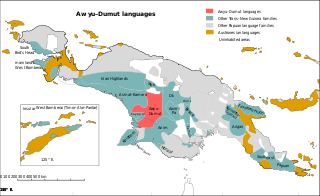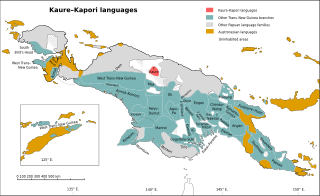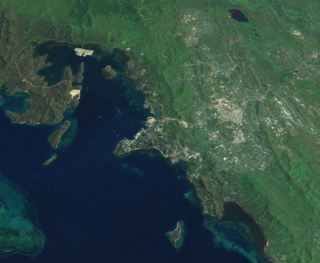The Border or Upper Tami languages are an independent family of Papuan languages in Malcolm Ross's version of the Trans–New Guinea proposal.

The Central Solomon languages are the four Papuan languages spoken in the state of the Solomon Islands.
Mailu, or Magi (Magɨ), is a Papuan language of Papua New Guinea.
Kaugel (Gawigl) is one of the languages spoken in the Southern Highlands province of Papua New Guinea. Native speakers call the area on the Southern Highlands side of the Kaugel River from the Western Highlands province home.

The Greater Awyu or Digul River languages, known in earlier classifications with more limited scope as Awyu–Dumut (Awyu–Ndumut), are a family of perhaps a dozen Trans–New Guinea languages spoken in eastern West Papua in the region of the Digul River. Six of the languages are sufficiently attested for a basic description; it is not clear how many of the additional names may be separate languages.

The Kaure–Kosare or Nawa River languages are a small family spoken along the Nawa River in West Papua, near the northern border with Papua New Guinea. The languages are Kaure and Kosare.
The Kwalean or Humene–Uare languages are a small family of Trans–New Guinea languages spoken in the "Bird's Tail" of New Guinea. They are classified within the Southeast Papuan branch of Trans–New Guinea.
The Koiarian languages Koiari are a small family of Trans–New Guinea languages spoken in the "Bird's Tail" of New Guinea. They are classified within the Southeast Papuan branch of Trans–New Guinea.
The Doga language is an Austronesian language spoken by about 200 people along Cape Vogel in the Milne Bay Province of Papua New Guinea.
Molof is a poorly documented Papuan language spoken by about 200 people in Molof village, Senggi District, Keerom Regency.
Tofanma or Tofamna is a poorly documented Papuan language of Indonesia. Wurm (1975) placed it as an independent branch of Trans–New Guinea, but Ross (2005) could not find enough evidence to classify it. It appears to be related to Namla, a neighboring language.
Deraa.k.a.Mangguar and Kamberataro (Komberatoro) is a Senagi language of Papua New Guinea and Indonesia. In Papua New Guinea, it is primarily spoken in Kamberataro village, Amanab Rural LLG, Sandaun Province.
Kovai is a Papuan language spoken on Umboi Island, halfway between mainland Papua New Guinea and the island of New Britain, and mostly within the caldera of that volcanic island.
Vabukori is a Motu Koitabu coastal village located in the Moresby South electorate of Port Moresby, the capital city of Papua New Guinea. Vabukori is one of the of villages in Central Province that speaks traditional Motu language along with other villages like Hanuabada and Porebada.
Mandobo, or Kaeti, is a Papuan language of Mandobo District in Boven Digoel Regency, Papua, Indonesia.
Keapara is an Oceanic language of Papua New Guinea. It is close to, but distinct from, its neighbour Hula.
Dadi Toka Jr is a Papua New Guinean businessman and the Chairman of the Motu Koita Assembly, a traditional landowner representative group established as an Assembly by an act of the Parliament of Papua New Guinea. The Chairman of the Motu Koita Assembly is also Deputy Governor of National Capital District, which was established on the lands of the Motu and Koitabu people.
The East Pauwasi languages are a family of Papuan languages spoken in north-central New Guinea, on both sides of the Indonesia-Papua New Guinea border. They may either form part of a larger Pauwasi language family along with the Western Pauwasi languages, or they could form an independent language family.

The Motu Koita Assembly is the landowner representative body of the Motu and Koitabu people, established as an Assembly by an act of the Parliament of Papua New Guinea. It is the only Assembly of its kind in Papua New Guinea. The current Chair of the Motu Koita Assembly is Dadi Toka Jr. The Chair of the Motu Koita Assembly also holds the office of Deputy Governor of National Capital District.
Tom Dutton was an Australian linguist specialising in Papuan languages and other languages of Papua New Guinea.




